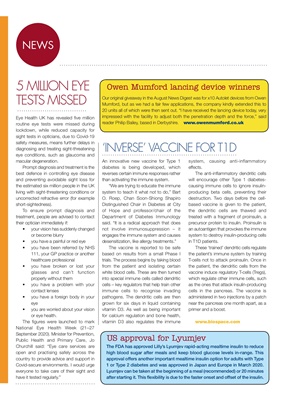
NEWS
5 MILLION EYE
TESTS MISSED
Our original giveaway in the August News Digest was for x10 Autolet devices from Owen
Mumford, but as we had a fair few applications, the company kindly extended this to
20 units all of which were then sent out. "I have received the lancing device today, very
impressed with the facility to adjust both the penetration depth and the force," said
reader Philip Bailey, based in Derbyshire. www.owenmumford.co.uk
Eye Health UK has revealed five million
routine eye tests were missed during
lockdown, while reduced capacity for
sight tests in opticians, due to Covid-19
safety measures, means further delays in
diagnosing and treating sight-threatening
eye conditions, such as glaucoma and
macular degeneration.
Prompt diagnosis and treatment is the
best defence in controlling eye disease
and preventing avoidable sight loss for
the estimated six million people in the UK
living with sight-threatening conditions or
uncorrected refractive error (for example
short-sightedness).
To ensure prompt diagnosis and
treatment, people are advised to contact
their optician immediately if:
• your vision has suddenly changed
or become blurry
• you have a painful or red eye
• you have been referred by NHS
111, your GP practice or another
healthcare professional
• you have broken or lost your
glasses and can't function
properly without them
• you have a problem with your
contact lenses
• you have a foreign body in your
eye
• you are worried about your vision
or eye health.
The figures were launched to mark
National Eye Health Week (21-27
September 2020). Minister for Prevention,
Public Health and Primary Care, Jo
Churchill said: "Eye care services are
open and practising safely across the
country to provide advice and support in
Covid-secure environments. I would urge
everyone to take care of their sight and
have it tested regularly."
Owen Mumford lancing device winners
An innovative new vaccine for Type 1
diabetes is being developed, which
reverses certain immune responses rather
than activating the immune system.
"We are trying to educate the immune
system to teach it what not to do," Bart
O. Roep, Chan Soon-Shiong Shapiro
Distinguished Chair in Diabetes at City
of Hope and professor/chair of the
Department of Diabetes Immunology
said. "It is a radical approach that does
not involve immunosuppression - it
engages the immune system and causes
desensitization, like allergy treatments."
The vaccine is reported to be safe
based on results from a small Phase I
trials. The process begins by taking blood
from the patient and isolating certain
white blood cells. These are then turned
into special immune cells called dendritic
cells - key regulators that help train other
immune cells to recognise invading
pathogens. The dendritic cells are then
grown for six days in liquid containing
vitamin D3. As well as being important
for calcium regulation and bone health,
vitamin D3 also regulates the immune
system, causing anti-inflammatory
effects.
The anti-inflammatory dendritic cells
will encourage other Type 1 diabetescausing immune cells to ignore
insulinproducing
beta cells, preventing their
destruction. Two days before the cellbased vaccine is given to the patient,
the dendritic cells are thawed and
treated with a fragment of proinsulin, a
precursor protein to insulin. Proinsulin is
an autoantigen that provokes the immune
system to destroy insulin-producing cells
in T1D patients.
These 'trained' dendritic cells regulate
the patient's immune system by training
T-cells not to attack proinsulin. Once in
the patient, the dendritic cells from the
vaccine induce regulatory T-cells (Tregs),
which regulate other immune cells, such
as the ones that attack insulin-producing
cells in the pancreas. The vaccine is
administered in two injections by a patch
near the pancreas one month apart, as a
primer and a boost.
www.biospace.com
'INVERSE' VACCINE FOR T1D
The FDA has approved Lilly's Lyumjev rapid-acting mealtime insulin to reduce
high blood sugar after meals and keep blood glucose levels in-range. This
approval offers another important mealtime insulin option for adults with Type
1 or Type 2 diabetes and was approved in Japan and Europe in March 2020.
Lyumjev can be taken at the beginning of a meal (recommended) or 20 minutes
after starting it. This flexibility is due to the faster onset and offset of the insulin.
US approval for Lyumjev